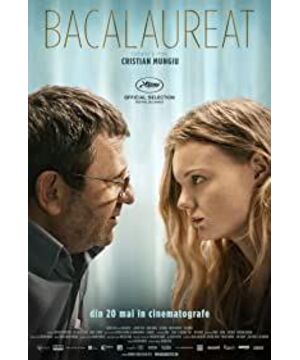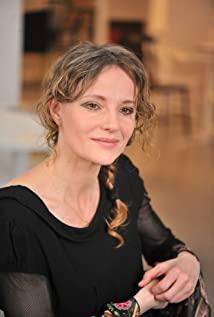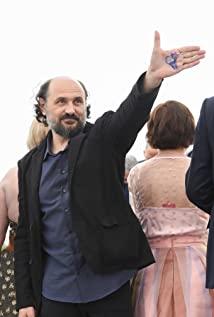Going back to this film, I don't know if the director really wanted to express the filth of society or something, maybe my senses are too rich, what I feel is that a big boy with a frustrated life wants to let his daughter follow her own ideas Growing up to escape what he thought was a filthy social system, yet her daughter knew how to use her strengths from her elementary school exams (proving her daughter was absolutely capable of coming into this world), and he was the only one It's just an outsider, who refuses to face the problem but has to say that he did his best.
Here's the scumbag's logic:
First of all, I think that the problem starts to appear when the male protagonist of the police station learns that his daughter is not a virgin. I think at this time he thinks that he and his daughter should have the most conversations, because he is in charge of his daughter from diet, daily life to study, so he thinks This is everything about the daughter, and the daughter should be able to say anything to him. However, there is a small detail here. On the way to take him to school, the daughter was thinking about friends after leaving, and he replied: What do you think, you should be happy, you can't stay here because of your friends, do the right thing Your best thing. Taking a closer look at these conversations, they were actually one-sided communications. He didn't enter his daughter's inner world at all, and he didn't care about her private life and friends. Then he left his daughter to be happy with his mistress, and didn't even want to answer the phone, hehe. This is a reflection of his resistance to this social system from the other side, because going to work can't change anything, or it's not even 10 o'clock, haha. (In this class, it’s really easy to report to the hospital every day. I think this is why the hospital looks so dilapidated. When watching the film, I should feel that the city is far behind the hospital, and there are many small high-rise residential buildings. The rough house, which is the building next to the school, is slightly better. The food is bread, apples and soup. The more backward the place is, the more corrupt it is. But think about it carefully, except for the male lead, everyone is very human. They are also very serious, so I think it is possible to survive in this system. It is terrible that everyone is indifferent and hurting each other.)
The second is that when the police officer asked him to bring up Bligh's liver donation list at the police station, he just said perfunctoryly that I could imagine a way. Maybe at this time I think it's his principle, but I think it's because it's none of my business and he doesn't need help, so I just perfunctory, I think it's more like indifference, why so Well, because the police officer was his classmate, he actually didn't care much about the police officer. Instead, the police officer took the initiative to help him several times. Another thing to note is that when the constable who painted the portrait asked him if he could say something nice to the priest, he didn't answer because the guy was nothing to him. When he went to the police station again, he found a lot of glass beads left on his friend's table. His friend said that he had broken down deeply and was afraid of wasting his time, so the doctor suggested that he take one ball every day, and his answer was Whether you were seeing a doctor or a priest, it was a bit sarcastic, and the police officer replied that it was a psychiatrist. It can be seen here that under the same system, two people have completely different ways of approaching life. The male protagonist has long given up, so he puts his dream on his daughter, but the police officer is different. The whole film does not point out that the police officer is very wealthy. . Later, his daughter had a problem with the first exam, and when the police officer offered to help him, he did not refuse. It also reflects that the officer sees him as a friend and he doesn't. Then this guy actually cried on the way home after dragging the relationship. I really felt inexplicable. When I got home, I started to instill my theories to my wife and daughter, and even said to my daughter: Go to the UK, you will doubt whether everything here is true. For most people, home is the root. How could they forget? I believe that if the male protagonist goes to the UK, he will cut off all contact with this side. As for why the people around him believe him, I guess he can say shamelessly: believe me, if there is any method that can be used to change this country, I will strongly advise you to stay and fight for it. Putting the most positive and image words on yourself can better imply that I am really good for you.
Let's look at the relationship between the male protagonist and his wife. The main contradiction between them is in the education of their children. The mother advocates that the child is brave enough to be himself, decides his own future and bears the consequences. The male protagonist just wants his daughter to realize her dream. , to pursue what one cannot pursue. In addition, the male protagonist is a super macho, all his own affairs are the most important, and he makes the right decisions, other people's affairs are secondary, or he answers perfunctory, which is probably related to his achievements and respect in the outside world. diametrically opposed. Of course, most of his decisions seem to be fine (because he can always say what everyone thinks is right, which is the worst part of lying to others). There is also the definition of rape. The male protagonist refuses to admit that it is rape. Anyone who knows the law knows that it is because of luck, because the rapist failed to get an erection, at least it should be an attempted rape. For her daughter, it is actually rape, but the male protagonist doesn't think so. It was not until her daughter hid in bed crying in the middle of the night that she realized that this incident did great harm to her daughter. The most ridiculous thing is that when he confessed to his wife that he had an affair, the wife firmly told him that he wanted to be with his daughter and told him to move out, but the male protagonist begged his wife to forgive me when he was sure that his wife had made up his mind. It's really not intentional, I really like this kind of person who doesn't see the Yellow River, and he probably thinks that his wife will forgive him after a while, because he thinks everything in the family is related to him, and his wife can't live without him. His wife told him: you know not everything is about you. (while they were talking about why their daughter wasn't a virgin and didn't tell him)
The male protagonist's attitude towards his mother can be seen from the first meeting. 1: Mom thinks the inspection notice is missing a page, and his answer is Mom, don't you even believe me? Usually we have no problem answering this way, but we can answer more clearly. 2: The photo the mother gave his daughter when she was a child, he also quickly flipped through it, asked the mother if she wanted to keep it, and then kept it for herself (in fact, you can print or wash a set for the mother or keep it for yourself, I guess he I don't even want to take pictures, because my daughter is about to leave this ghost place, these pictures will only remind him of the pain here, including physical fitness, wife, work, etc.). 3: Mom asked him to clear the weeds in the cemetery and put some cement, but he just replied that I would consider it. (Again perfunctory, things that are not important to him are perfunctory) He just wants to leave quickly to do those things he thinks are important, but this old woman is his mother and can't ignore it. In addition, I carefully noticed that when he talked to his mother about his daughter, all the answers were his own answers to the social system. Only his mother said that it was no different from other places and admitted that he changed what he could. I do Felt that the theme of this film was a word from his mom: she should stay, change the status quo, and if they all go who's going to change it.
The relationship between the male protagonist and his mistress, when the mistress told him that his aunt was postponed for 6 days, his answer was: I didn't expect it, do we have to talk about this issue now? This also confirms his indifference to others and his machismo. I think he was trying to figure out the worst outcome based on common medical knowledge. As for the consequences, he didn't want to think about it at all. In the absence of absolute facts to prove that it was pregnancy, he felt that he would not make any commitments and plans for this woman. The male protagonist and his mistress have a topic, probably because of the same educational concept. From the mistress telling his mother that I don't want my child to be a mother's treasure in the future, I guessed that the mistress will not be with her in the end, because she found that the male protagonist will never be with her. In evading planning for their future, even when the mistress proposed to go to the hospital (abortion), he didn't say anything. I think the reason why he let the mistress put down her guard is because the male protagonist never avoids talking about the mistress's son, thus causing harm to her. illusion. This also proves that the male protagonist's values are right in some places (in fact, everyone is like this, it's just that the scum is more subtle and the scum is completely different). There is also when the male protagonist takes the boy to the park to play, when the child throws things away because others jump in the queue, he teaches the child that it is impolite and cannot do this. When the child asks him how to be polite, he To be able to give this very complicated answer, I just want to say buddy: I really admire you! !
While watching the scene of him and his daughter's boyfriend, in fact, he couldn't get used to this man who sold motorcycles for a long time, and later he asked this man to meet at the crime scene. He concluded that the man was present at the time, and the boyfriend refused to admit it (although we didn't know whether he was lying or not at this time), and there is an important clue here that the boyfriend said that I called the police after I saw her. The daughter can know after confirming, in other words, his daughter must know whether his boyfriend helped her in time. Then we can understand this scene like this. The male protagonist was deeply rooted in the influence of his temperament. At the police station, he also said that several witnesses were afraid of the incident, so he concluded that his boyfriend was at the scene and was afraid of the incident based on the pictures that he could not see at all. Without the consequences of calling the police, he made an excuse to let him not be with his daughter, but from the back, the daughter said beside the motorcycle: You would think that he was watching from the sidelines (prove that she had confronted her boyfriend). On the other hand, the fact that the prosecutor does not accept bribes can also reflect from the side that this guy is an angry youth. Others can live well under this physique and fulfill their responsibilities and principles. He is a lot of shit, like the government owes him. of.
The most classic scene is of course the final school ceremony. His daughter decided not to go to the UK, and said that when I was a child, I would cry in exchange for answering questions for a while (cheating), or knowing how to adapt to my physique. I believe that the classmates standing beside her also believe in the future they plan.
The above is my answer to this movie. What I see is that since there is no way to escape the physique, you should adapt to him. Ordinary people will never have access to those really dirty things. Don't fucking teach the next generation, hurt the people around you, otherwise you will end up like a male protagonist, which can be described as ignorance, you don't even know where you are wrong, and you lie to yourself by relying on some hypocritical values. Others, who end up the same as the male protagonist, I suggest everyone to watch the rare domestic good drama "Ten Thousand Arrows Through the Heart".
View more about Graduation reviews











